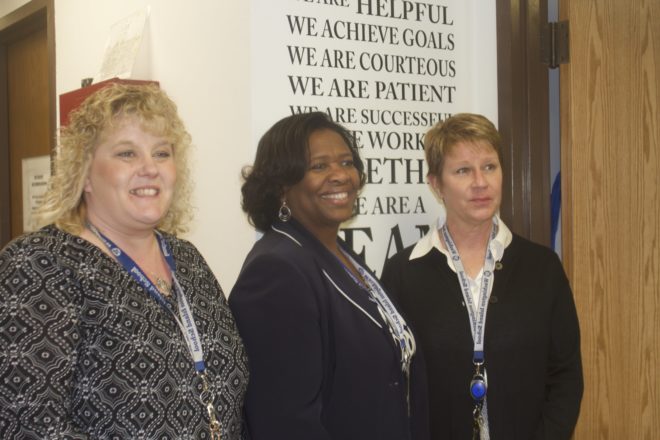State Superintendent of Schools Visits Washington Island
- Share
- Tweet
- Pin
- Share

One of the biggest names in education – Wisconsin State Superintendent of Public Instruction Carolyn Stanford Taylor – visited the smallest district in Wisconsin, Washington Island School District, on May 21 with Scott Jones, her chief of staff. She spent the day visiting classrooms to meet with administrators, teachers and students.
“We want to hear the voices,” Taylor said to a high school English class. “I’m interested in new learning and new ideas.”
It was a meaningful visit for the district for many reasons, Principal Michelle Kanipes said. She’s hoping the visit might give Taylor a clearer understanding of how public-education decisions affect rural school districts.
“When Ms. Taylor and her staff are making educational-based decisions, we are hopeful that she remembers her visit to our island school district and is able to better see a bigger picture regarding the significance such policy and decision-making has for all school districts in Wisconsin,” Kanipes said.
Taylor, who was appointed by Gov. Tony Evers and began her role in January 2019, is the first African-American state superintendent in Wisconsin. Before she joined the Department of Public Instruction in 2001, she served as a teacher and principal in Madison.
Taylor said she’s focused on expanding the equity agenda. She wants equal access and opportunities for children with special needs, ELL (English-language learner) students, children of color and children in poverty. The Legislature is currently deliberating on the budget, and she said she’s hoping for results by the end of June.
“As state superintendent, I see opportunities in working with both Republicans and Democrats,” Taylor said. “I’ve met legislators from both sides and will continue to work with legislators and the governor on the issues facing Wisconsin’s kids.”
Funding for these areas is difficult, especially for schools in which enrollment is declining, Rep. Joel Kitchens told the Pulse in regard to the Blue Ribbon Commission on School Funding that’s recommending legislative action. The island school passed a nonrecurring referendum for $595,500 for the 2019-20 school year and $635,000 for 2020-21 by a nearly three-to-one margin.
The uniqueness of the K-12 school enticed Taylor to visit, she said. She’s been to a number of districts around the state and wants to continue her visits.
Washington Island has the same needs as other rural schools, but its isolated location brings an additional set of challenges. For example, a speech therapist visits the island every Wednesday, Thursday and Friday to work with children who need speech therapy, but there is no designated classroom for this. They work in Kanipes’ office.
School Board President Amy Jorgenson said it’s also difficult for the school to find teachers – most are teach multiple subjects across multiple grades, and some even coach sports. It was the first day of spring soccer practice, and Marleen Johnson, English language-arts teacher for grades three through six, was filling in as coach.
“I looked up how to coach soccer last night,” Johnson said.
The lack of housing also makes it hard to attract people from the mainland, Superintendent Sue Cornell said – an issue that spans all of Door County.
Class sizes are extremely small. On the island, a class of 10 is large. There are kids who went through their first five grades alone, and there have been grades with no students at all. This year, the graduating class totals three students.
Though the district has faced challenges, there are great benefits, too: the one-on-one time that students get with teachers. Taylor asked students in almost every classroom what they like best about school on the island, and that was the most common answer.
“I like how we’re all like a big family,” one student said.
Students are able to form a relationship with their teachers that fosters an atmosphere of comfort. They’re able to articulate when they don’t feel confident in a certain subject or don’t enjoy it, which is a great benefit, Taylor said.
Support from the community helps to keep the school afloat. What it can’t give directly to the students, it compensates for, said high school English teacher Leila Nehlsen.
The district has a co-op program with Gibraltar for spring sports and prom. It’s an opportunity for the students to meet people from other schools, but it’s still a challenge. Students do a lot of fundraising for their sports themselves, and they usually have to find overnight hotel accommodations because the last ferry has typically left before they’re finished playing.
The Trueblood Performing Art Center hosted the school’s first musical production, directed by Kanipes. Island Players has also tried to support the kids and help keep music in the school.
It’s the school board’s goal to deliver well-rounded experiences to the children that students from other schools take for granted.


